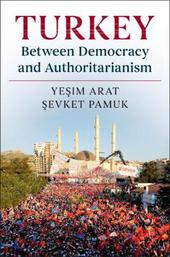
|
Turkey between Democracy and Authoritarianism
Paperback / softback
Main Details
| Title |
Turkey between Democracy and Authoritarianism
|
| Authors and Contributors |
By (author) Yesim Arat
|
|
By (author) Sevket Pamuk
|
| Physical Properties |
| Format:Paperback / softback | | Pages:308 | | Dimensions(mm): Height 227,Width 152 |
|
| Category/Genre | Islam
Political economy |
|---|
| ISBN/Barcode |
9780521138505
|
| Classifications | Dewey:321.009561 |
|---|
| Audience | | Tertiary Education (US: College) | | Professional & Vocational | |
|---|
| Illustrations |
1 Tables, black and white; 2 Maps
|
|
Publishing Details |
| Publisher |
Cambridge University Press
|
| Imprint |
Cambridge University Press
|
| Publication Date |
5 September 2019 |
| Publication Country |
United Kingdom
|
Description
Since the 1980 military coup in Turkey, much of the history and politics of the country can be described as a struggle between democracy and authoritarianism. In this accessible account of the country's politics, society and economics, the authors delve into the causes and processes of what has been called a democratic 'backsliding'. In order to explore this, Yesim Arat and Sevket Pamuk, two of Turkey's leading social scientists, focus on the mutual distrust between the secular and Islamist groups. They argue that the attempts by a secular coalition to circumscribe the Islamists in power had a boomerang effect. The Islamists struck back first in self-defence, then in pursuit of authoritarian power. With chapters on urbanization, Kurdish nationalism, women's movements, economic development and foreign relations, this book offers a comprehensive and lively examination of contemporary Turkey and its role on the global stage.
Author Biography
Yesim Arat is Professor in the Department of Political Science and International Relations at Bogazici UEniversitesi, Istanbul. She is the author of The Patriarchal Paradox: Women Politicians in Turkey (1989), Rethinking Islam and Liberal Democracy: Islamist Women in Turkish Politics (2005), Violence against Women in Turkey (2007, with Ayse Gul Altinay, the Turkish version received the 2008 Pen Duygu Asena Award) and numerous articles on women and also Turkish politics. She served as a board member in various academic journals and also in UNRISD. She is a member of the Science Academy, Turkey. Sevket Pamuk is Professor of Economics and Economic History at Bogazici UEniversitesi, Istanbul. He is the author of many books and journal articles on Ottoman, Middle East and European economic history, most recently of Uneven Centuries: Economic History of Turkey since 1820 (2018). He was Professor and Chair in Contemporary Turkish Studies at the London School of Economics and Political Science from 2008 to 2013. Pamuk was President of the European Historical Economics Society, President of the Asian Historical Economics Society, Editor of the European Economic History Review and is a member of Academia Europea and Science Academy, Turkey.
Reviews'What happened to Turkey? How did the promise of a vibrant democracy in the Middle East sour? How did Turkish politics become a one-man show? Yesim Arat and Sevket Pamuk tackle head-on Turkey's descent into the growing ranks of authoritarian, nationalist regimes. Turkey's budding democracy in the 1980s and 1990s, they argue, was illiberal, fostering growing tensions between secular and religious sectors. And, once the Islamist party was able to prevail in national elections, it cast aside the rule of law. This book is a must read for anyone who wants to understand, not only Turkey, but authoritarianism's tightening grip worldwide.' Joel S. Migdal, Robert F. Philip Professor of International Studies, University of Washington 'Arat and Pamuk convincingly show how socioeconomic change and growing mistrust among secular and Islamist elites led to the breakdown of democracy in Turkey. Their account provides important and sobering lessons for our time: even countries that have achieved impressive economic gains are not immune from democratic backsliding in the face of destabilizing socioeconomic change and political polarization.' Melani Cammett, Clarence Dillon Professor of International Affairs, Harvard University 'This book, written by two leading and erudite scholars of Turkish society, is certain to become an invaluable reference for all students of Turkey. It requires special skills to harmoniously bring together sociological, political, economic and historical perspectives under a single analytical umbrella and the authors perform this task admirably. I will venture to predict that Arat and Pamuk's work will become an indispensable source not only for experts but for a much wider audience.' Yilmaz Esmer, Bahcesehir University, Istanbul 'A must read for anyone interested in understanding contemporary Turkish politics ...' H. Shambayati, Choice
|